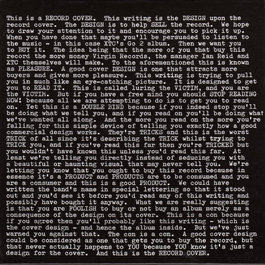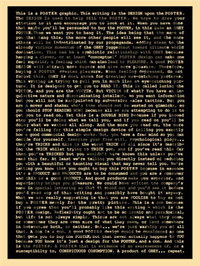Go 2
From The Giant: The Definitive Obey Giant Site
Go 2 was the second album by influential new wave band XTC. It was released on October 6, 1978. The cover of the album served as the model and inspiration for Shepard Fairey's 2006 work This is a Poster.
From Wikipedia
Album cover: The album's cover is an inverse-printed essay on the subject of the function of a commercial.
The essay reads: "This is a [place album format here in all capitals] COVER. This writing is the DESIGN upon the [place album format here] cover. The DESIGN is to help SELL the [place album format here]. We hope to draw your attention to it and encourage you to pick it up. When you have done that maybe you'll be persuaded to listen to the music - in this case XTC's Go 2 album. Then we want you to BUY it. The idea being that the more of you that buy this [place album format here] the more money [place record company here], the manager Ian Reid and XTC themselves will make. To the aforementioned this is known as PLEASURE. A good cover DESIGN is one that attracts morebuyers and gives more pleasure. This writing is trying to pull you in much like an eye-catching picture. It is designed to get you to READ IT. This is called luring the VICTIM, and you are the VICTIM. But if you have a free mind you should STOP READING NOW! because all we are attempting to do is to get you to read on. Yet this is a DOUBLE BIND because if you indeed stop you'll be doing what we tell you, and if you read on you'll be doing what we've wanted all along. And the more you read on the more you're falling for this simple device of telling you exactly how a good commercial design works. They're TRICKS and this is the worst TRICK of all since it's describing the TRICK whilst trying to TRICK you, and if you've read this far then you're TRICKED but you wouldn't have known this unless you'd read this far. At least we're telling you directly instead of seducing you with a beautiful or haunting visual that may never tell you. We're letting you know that you ought to buy this [place album format here] because in essence it's a PRODUCT and PRODUCTS are to be consumed and you are a consumer and this is a good PRODUCT. We could have written the band's name in special lettering so that it stood out and you'd see it before you'd read any of this writing and possibly have bought it anyway. What we are really suggesting is that you are FOOLISH to buy or not buy an album merely as a consequence of the design on its cover. This is a con because if you agree then you'll probably like this writing - which is the cover design - and hence the album inside. But we've just warned you against that. The con is a con. A good cover design could be considered as one that gets you to buy the [place album format here], but that never actually happens to YOU because YOU know it's just a design for the cover. And this is the [place album format here in all capitals] COVER."
On the actual cover artwork, the labeling of the album's format is used in place of the words "[place album format here in all capitals]" in its display of the essay on the album's various formats. The display of the essay on the LP started and ended with the words "This is a RECORD COVER," the display of the essay on the cassette started and ended with the words "This is a CASSETTE COVER," and the display of the essay on the CD started and ended with the words "This is a COMPACT DISC COVER."
On some editions of the album, some of the words are missing and appear only on a poster included inside the album. The poster must be aligned correctly with the cover to read the complete text.
From Obeygiant.com
THIS IS A POSTER... "So, I have been made aware of a couple of typos in THIS IS A POSTER. I've read the copy at least 10 times and didn't notice the errors. Too bad it is already printed. Yeah, serves me right for making a poster with smug copy. Instant karma will get you. There will be no recall of the poster as I think it still works typos 'n' all. Oh, I might also mention that the poster was inspired by XTC's "GO TO" [sic] album cover." -Shepard
© Copyright |
|---|
| This page contains an image or images of drawings, paintings, photographs, prints, or other two-dimensional works of art, for which the copyright is presumably owned by either the artist who produced the image, the person who commissioned the work, or the heirs thereof. It is believed that the use of low-resolution images of works of art for critical commentary on the work in question, the artistic genre or technique of the work of art, or the school to which the artist belongs on the English-language website thegiant.org, hosted on servers in the United States, qualifies as fair use under United States copyright law. |

